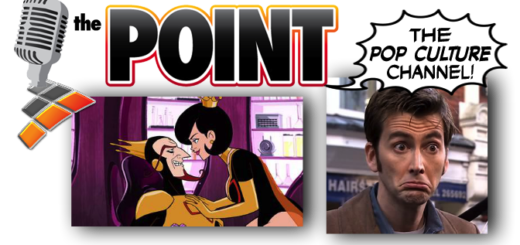Nudity and the Editorial Process, by Dennis O’Neil
 In my dotage, I’m coming to believe that a little adolescent rebellion is usually a good thing, and if the rebellion creeps a year or two into full, card-carrying adulthood, that’s okay. Much after the fact, I learned of some things my kid did in his Greenwich Village youth: I’m not sorry he did them and I’m glad I didn’t know of them until much later.
In my dotage, I’m coming to believe that a little adolescent rebellion is usually a good thing, and if the rebellion creeps a year or two into full, card-carrying adulthood, that’s okay. Much after the fact, I learned of some things my kid did in his Greenwich Village youth: I’m not sorry he did them and I’m glad I didn’t know of them until much later.
(As for myself…let me note that the principal of my high school told my mother after graduation that they never, ever wanted to see me again. I must have done something…)
Father does not always know best and either does Mother. Like generals, they’re fighting old wars and kids are caught in new wars, which means the kids have to find their own way, which is a process of experimentation, which means that Junior and Pops can’t and shouldn’t march in lock step,
We will now retire the military metaphors and explain what any of this has to do with our current topic, the evolution of superheroes.
A few years ago, there was a brief vogue of making old-timey, boring-and-dull, goody-two-shoes hero’s jerks. I think it was often a form of young man’s rebellion, a thumbing-of-the-nose at the Establishment. It’s like comics artists who sneak naughty words into the background of busy shots, maybe as wall graffiti, or the guy who drew a woman naked and thought that a color hold over her body would conceal her lushnesses. (It didn’t, and an editor got yelled at.)
This kind of activity is, I submit, a bit like scrawling shit in wet concrete. Not a hanging offense, maybe a valuable part of the perpetrator’s psychological development. (But not necessarily without consequence, as witness the above-cited editor who let his attention flag for a little while and got roasted. I can think of at least two instances when I had similar attention lapses and didn’t think the artists/writers were even a smidgen cute. This stuff can put a man in the unemployment line.) Practical considerations aside, my objection to this brand of rebelliousness is that it’s bad storytelling. If you get a better story by making Charlie Virtue a crumb, that’s a pretty good reason for doing it. If you don’t, it’ll distract a lot of readers from the story you’re actually trying to tell, and you don’t want to do that. Lousy craftsmanship.
Note: this is not the same thing as having a bleak view of the human condition and using superhero tales to reflect and express that. Such productions may not always be my idea of entertainment, but that’s a question of taste, not morality or aesthetics.
In the world of day-to-day publishing, editors have to decide where to draw the various lines involved, one of the hardest parts of the job, and the least satisfying. Err on one side and you’re being a censor; err on the other, and you and/or one of your creators could get fired.
Let’s circle back to this subject later.
RECOMMENDED READING: Einstein, by Walter Isaacson
Dennis O’Neil is an award-winning editor and writer of comic books like Batman, The Question, Iron Man, Green Lantern and/or Green Arrow, and The Shadow, as well as all kinds of novels, stories and articles. The Question: Zen and Violence is on sale right now in trade paperback.













And the comics publishers damned their creative staffs to a uniquely low circle of hell in 1953 when they conspired to restrict trade via their heinous Comics Code Authority scam.
My favorite, most requested 'art correct' was the 'no nipples' directive.You could take white tape and make little pasties over the drawing's chest/boobs.
I promise you that, had the publishers not come up with the CCA, Congress would have don a lot worse.Remember – Estes Kefauver, apparently, wanted some of that good viewing with alarm and saving the nation PR like Tailgunner Joe was getting, and jumped on Dr Wertham's bandwagon.
"I promise you that, had the publishers not come up with the CCA, Congress would have don a lot worse." Yeah, except for that nasty First Amendment thing, which was far more in effect in the mid-50s than it is today.If the publishers got slammed by Congress, they would have had a wonderful case. And I think it's pretty clear the Supreme Court — the Warren Court — would have upheld their position. But the publishers were too cheap and too scared to do anything but back down.And why shouldn't they? The Code and the times eliminated an enormous amount of competition from top sellers like EC and Gleason. There was so much unemployed talent wandering around the big surviving publishers could cut page rates and make their product even more profitable.
Regarding the artist who thought a colour hold would cover the nekkid character (what character, BTW?), Mel Lazarus's great novel of the early days of the Silver Age, "The Boss Is Crazy Too", features a production manager who literally knows nothing about his job; he's the publisher's wife's unemployable cousin, and giving him a job is part of the price of getting family mopney to keep the company afloat.The artists hae him, and the inker has a habit of lettering obscenities in areas that are going to be solid black, just to honk him off. He's positive that, one day, the black isn't going to cover it up.So, one week, the bullpen crew grab one of the sample bundles of comics coming into the office, and, with a rubber stamp and dark grey ink, stamp an obscene word in the same place in a black doorway the hero has just emerged from, gun blazing.And then they tie the bundle back up and leave him to find it…(For those who haven't read the book, i will mention that the publsiher's name is Fulton A. Fineman. I'm sure no resemblance to any actual bullpens, living or dead, was iontended…)
Mel Lazarus' tale draws on more than comics-bullpen life, at that. Many such pranks as that rubber-stamp stunt have figured in the news-publishing racket.A bullying, paranoid managing editor from my early days as a reporter was similarly obsessed with "hidden meanings" in the news stories and the headlines. Art Director George Turner and I made a point of taunting this guy with bogus glitches — a thoroughly irresponsible response.One day's editions carried a banner story about a meat company's decision to build a local factory: GIANT PACKER FIRM TO OFFICE HERE. George and I cobbled together a fake variation — simply a matter of switching places for an "A" and an "I" — and ran off a realistic proof-page. Then we sneaked the counterfeit onto the editor's desk. One seldom hears "Stop the presses!" hollered with such urgency.
Alfred Bester told the tale of when he noticed that DC editorial were rewriting his gibberish – you know, the stuff you wrote to go in balloons for "native languages" back in the Bad Old pre-PC Days. He asked why.The reply: "We know you're a smart-ass and you know several languages, so we're rewriting it just to make sure you don't sneak something dirty in."So, he said, he decided that he'd put something rude in without disguising it and still get it through – so he named a character "Mr Merkin".